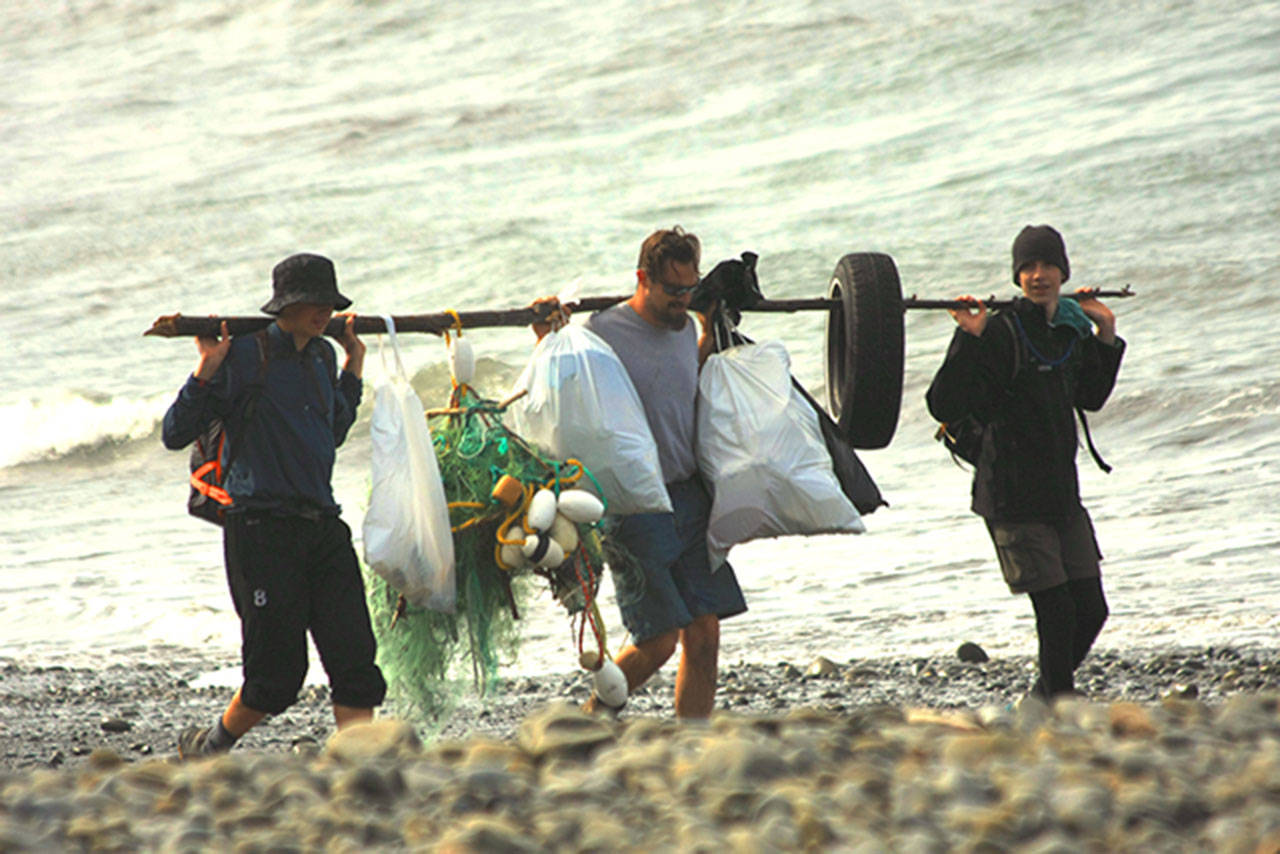On one April morning last year, over 1,400 volunteers came together to remove more than 20 tons of trash from at least 50 beaches during the Washington Coast Cleanup.
Unfortunately, this was not an extreme amount of debris found on beaches from Cape Disappointment to Cape Flattery. It was a unique day because of the number of people focused on addressing the problem of plastic pollution.
Every spring, thousands of pounds of plastic, rope, bottles, foam and other junk wash up on the beaches of Washington state. Carol Bernthal, superintendent of the Olympic National Marine Sanctuary, is inviting volunteers to help with this year’s Washington Coast Cleanup.
“Nobody likes to look at marine debris, especially on our wilderness coastline,” she said. “For wildlife, it’s not just ugly, it can kill. This is a chance to make a difference, joining with 1,000 other people who share that goal.”
Every April for the past 10 years, Washington CoastSavers and its partners and volunteers have cleaned up what the winter storms have brought in.
“Usually this effort is done on the Saturday closest to Earth Day,” said Jon Schmidt, CoastSavers coordinator. “But this year the tides are high on Earth Day morning, so we’re cleaning the beach the following Saturday.”
Gov. Jay Inslee declared Saturday, April 29, as Washington Coast Cleanup Day.
“The success of the effort to save our coast from marine debris depends on participation by volunteers from outdoor recreation groups, schools, service clubs and community organizations throughout Washington,” he said.
Volunteers who participate in the Washington Coast Cleanup are part of something bigger than themselves. Of course, anyone can clean the beach any day of the year. Large coordinated beach cleanups like this one and the International Coastal Cleanup, held in September, are different not only in their scale but also in their impact.
For tens of thousands of pounds of trash to be picked up from dozens of beaches in a few hours requires hundreds of volunteers, as well as support from public agencies.
“As spring approaches, we hope everyone who loves our ocean beaches and shorelines will think about signing up for the Washington Coast Cleanup,” said Don Hoch, director of the Washington State Parks and Recreation Commission.
“These cleanups are a real inspiration, as people get together all over the coast to clean up the beaches for people and wildlife,” he added. “As more people join these efforts, we can all hope that fewer will leave trash behind on our beautiful beaches and shorelines.”
Many beaches within Olympic National Park are also being cleaned April 29. The park’s wilderness coast presents unique challenges in that everything has to be taken off the beach by foot.
Some hard-core volunteers hike several miles just to get to beaches including the one at Ozette, where the trail is a 3-mile boardwalk. Once at the beach, these volunteers often hike several additional miles and collect trash on their way back to the trailhead.
“Olympic National Park is grateful to the thousands of volunteers who dedicate their time to look after and protect the diverse resources found on the Olympic coastline,” said Sarah Creachbaum, superintendent of the park.
More than garbage bags are used to haul out debris. Some volunteers tie multiple buoys or floats to their framed backpacks. Other volunteers roll tires out one by one. It takes all kinds of ingenuity and lots of sweat to keep the coast clean.
Up and down the coast and into the Strait of Juan de Fuca, volunteers are rewarded for their sometimes strenuous efforts. Multiple barbecues are provided by a variety of partners, including the Surfrider Foundation, Washington State Park Ranger Association, Friends of Olympic National Park, Chito Beach Resort, Lions Clubs and other organizations.
Camping in the coastal campgrounds of Olympic National Park is free for volunteers on Friday and Saturday nights during beach cleanup. These campgrounds include Kalaloch, Mora and Ozette. Back-country camping fees are also waived for volunteers who choose to stay the night on one of the wilderness beaches of Olympic National Park.
Washington CoastSavers is an alliance of partners and volunteers dedicated to keeping the state’s beaches clear of marine debris. Founding members of CoastSavers include representatives from Clallam County, Discover Your Northwest, the Grass Roots Garbage Gang, Lions Club International, Olympic Coast National Marine Sanctuary, Olympic National Park, Pacific Coast Shellfish Growers Association, Surfrider Foundation and Washington State Parks and Recreation Commission.
Since 2007, their efforts have removed thousands of tons of trash off the beach during the Washington Coast Cleanup.
To learn more about Washington CoastSavers or to pre-register for the Washington Coast Cleanup, visit www.coastsavers.org.


